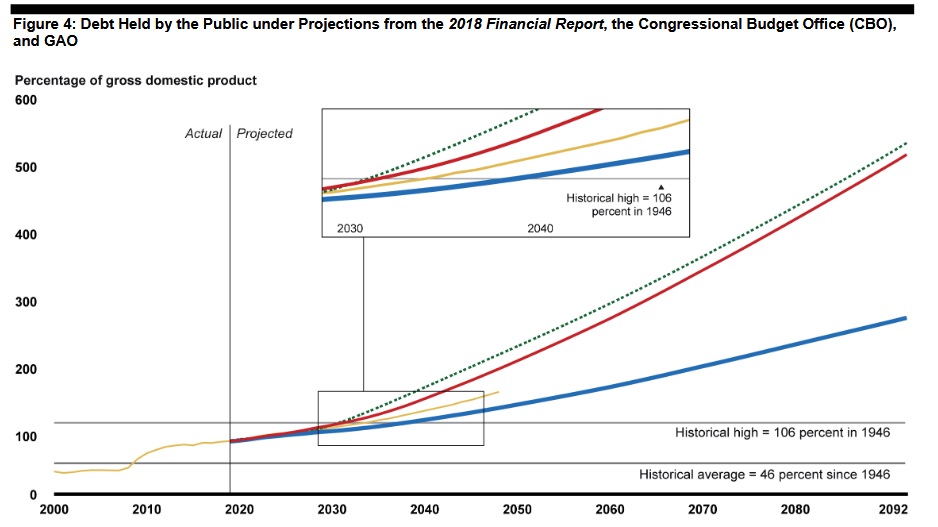GAO: Current Federal Fiscal Situation Is 'Unsustainable'
America will face "serious economic, security, and social challenges" if the national debt keeps growing at this rate.

Just hours after Congress postponed a budget vote because lawmakers wanted even more spending, the Government Accountability Office (GAO) published a 67-page report warning of the "serious economic, security, and social challenges" that will face this country unless immediate action is taken to bring the national debt under control.
The share of debt held by the public currently stands at about 78 percent of gross domestic product (GDP), a shorthand measure of a country's economic output in a single year. The GAO estimates that it is on track to surpass the all-time high of 106 percent of GDP within the next 13 to 20 years. (The numbers are actually worse than that, because "debt held by the public" accounts for only $15.8 trillion of the $21 trillion national debt. The rest is held by parts of the federal government, such as the Social Security trust fund.)

Tax revenue increased by $14 billion during fiscal year 2018, which ended on September 30. But that increase was buried beneath a $127 billion jump in spending.
Federal policy makers "face a federal government highly leveraged in debt by historical norms and on an unsustainable long-term fiscal path caused by an imbalance between revenue and spending that is built into current law and policy," the GAO says in a letter to President Donald Trump and congressional leaders that accompanied the new report. "Decisions in the near term to enhance economic growth and address national priorities need to be accompanied by a long-term fiscal plan to put the federal government on a sustainable long-term path. This is essential to ensure that the United States remains in a strong economic position to meet its security and social needs, as well as to preserve flexibility to address unforeseen events."
Congress and the president have been getting that same message from several sources recently. Unfortunately, no one seems to be listening.
The White House produced a budget plan earlier this year that called for hiking Pentagon spending while cutting non-military discretionary spending by 9 percent. Even with overly rosy assumptions about future economic growth, this budget would effectively lock in trillion-dollar deficits for the next several years and would not balance until the mid-2030s, long after Trump will be out of office. And that's only if you believe the White House is serious about cutting spending. Given how quickly the president flip-flopped on his own administration's plan to cut the feds' miniscule contribution to the Special Olympics, that requires a leap of faith.
But what else would you expect from a president who has said that he doesn't have to worry about the debt and deficit because things won't get really bad until after he's out of office?
Congress is no better at the moment. Republicans might have once been counted on to hold the line on spending, but under Trump they've abandoned even the pretense of fiscal responsibility. Democrats, meanwhile, want to spend trillions more on programs like Medicare for All and the Green New Deal.
Even if those big ideas don't come to pass, spending is likely to increase. A budget bill that was supposed to get a vote in the House this week would have increased discretionary spending caps by $358 billion over the next two years—a total cost of more than $2 trillion in a decade, according to an analysis by the Committee for a Responsible Federal Budget. The planned vote never happened, because rank-and-file Democrats revolted and pushed for more spending.
It seems like the only way Congress might prevent America's fiscal situation from getting worse is by failing to agree on how much worse to make it.
But time and tides and interest calculations wait for no one. "Over the long term, the imbalance between spending and revenue that is built into current law and policy is projected to lead to continued growth of the deficit and debt held by the public as a share of GDP," the GAO warns. "This situation—in which debt grows faster than GDP—means the current federal fiscal path is unsustainable."


Show Comments (96)